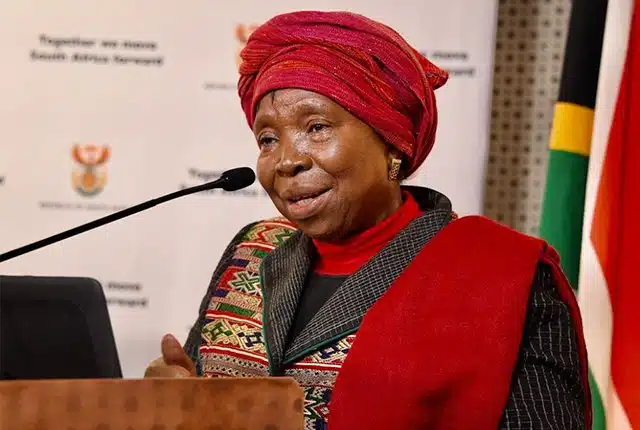
New proposals to clean up local government – R1,000 at a time
Cooperative Governance and Traditional Affairs minister Nkosazana Dlamini Zuma has gazetted new code of conduct changes for councillors in South Africa for public comment.
The regulations – which aim to facilitate the application of Schedule 7 of the Local Government: Municipal Structures Act, 1998 – proposes several changes for local governance, the most prominent of which requires councillors and other officials to declare ‘gifts’ they receive over R1,000 – and who they receive them from.
Schedule 7 of the Act was introduced in 2021, which added a code of conduct to the local government laws, governing how councillors should conduct themselves, declaring their interests, attending meetings – and penalties for not doing so.
The latest rules were drafted after consultation with the members of executive councils responsible for local government in the provinces and organised local government representing local government nationally, Dlamini Zuma said.
Under the new code of conduct, gifts received by a councillor must be declared in writing to the municipal manager where the value of a gift exceeds R1,000 or a higher amount. This value may be changed and determined by the minister from time to time.
The declaration must also be made if the value of gifts received from a single source in any calendar year exceeds the threshold of R1,000 or the amount determined by the minister
Councillors will have to include the description of the gifts, indicate the value and source of the gift, and include the name and address of the person or organisation making the gift, as well as the relationship between the councillor and the person or organisation making the gift.
“A councillor receiving the gift must also make the person making the gift aware that their details will be included in the council’s gift register,” the minister said.
Parliament’s Joint Committee on Ethics and Members’ Interests already publishes a list of members’ interests in this regard. However, to date, councillors and other local government structures have not had the same requirements.
The new code of conduct also expands on the processes to be followed when a councillor is found to be in arrears with payments due to the municipalities they serve.
A councillor in this position has to meet with the municipal manager to arrange a payment plan or another arrangement to make sure the debt is paid up. If they remain in arrears for more than three months, they are in violation of the code of conduct and will face penalties.
The code also requires a bi-annual report to be published, with quarterly updates.
Fixing local government
The proposed changes to the code of conduct come amid a push from the national government to fix up the mismanagement and poor administration of local governments across the country.
Over the last few years, Cogta has pushed for the ‘professionalisation’ of local governments through skill development, while president Cyril Ramaphosa has pleaded with mayors and other local government officials to get their act together.
Addressing the South African Local Government Association’s Council of Mayors in September, Ramaphosa said that almost a year after the local government elections in 2021, services in municipalities across the country remain poor, and the relationship with residents has broken down.
He said that residents have lost faith in local government and pleaded with officials to “get back to basics” to fix the problems.
For local government, these basics include:
- Putting people and their concerns first;
- Supporting the delivery of municipal services to the right quality and standard;
- Promoting good governance, transparency and accountability;
- Ensuring sound financial management and accounting; and,
- Building institutional resilience and administrative capacity.
“We are all familiar with these basic actions, and we all agree that we must prioritise them,” he said. “The question then is, why are we not successful in implementing these actions?”
The president said that the reality is that local government cannot get back to basics while this sphere of government is seen as a “terrain of patronage, political squabbles and personal enrichment”.
Senior officials from Treasury painted a bleak picture when they appeared before Parliament’s Standing Committee on Appropriations in September, noting that 151 municipalities are teetering on the brink of collapse, while 43 have already collapsed and require urgent intervention to rescue them.
Read: 151 municipalities in South Africa on the brink of collapse: Treasury



